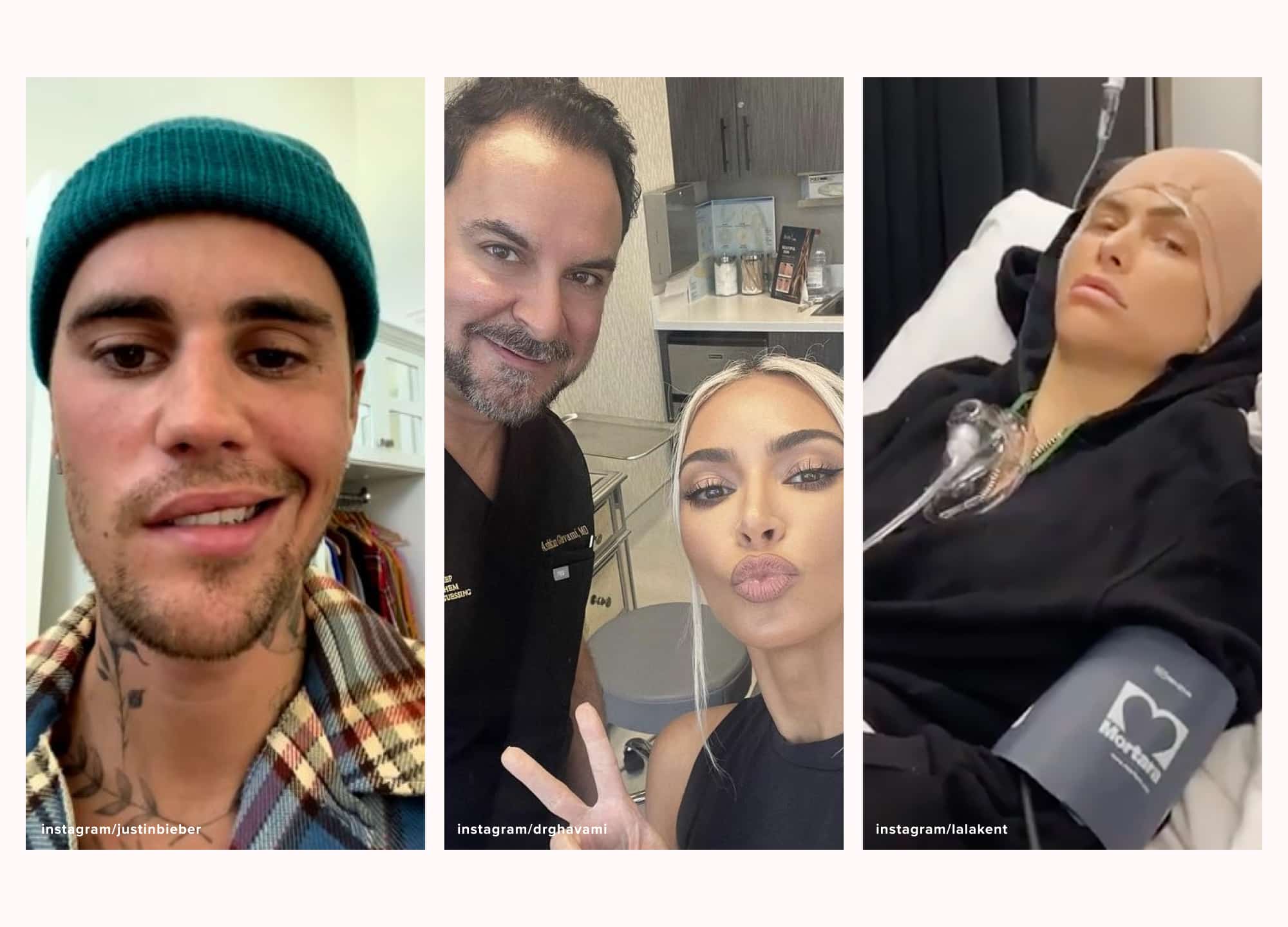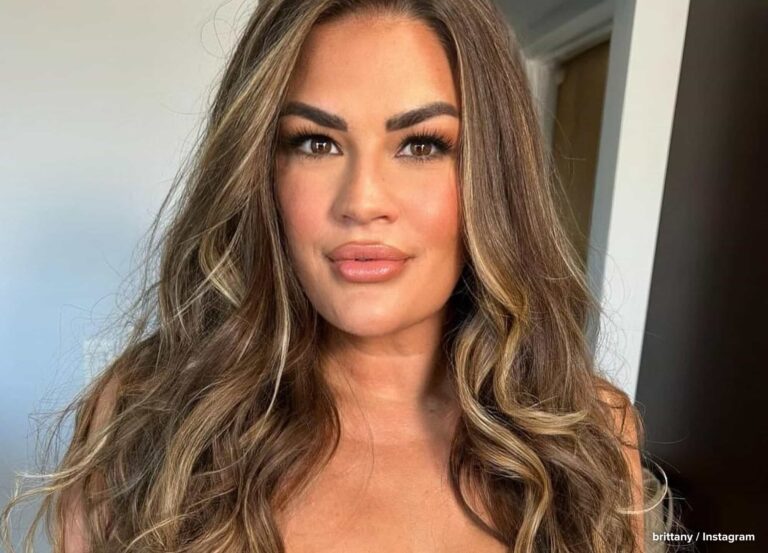Every month, we strive to bring you a balanced mix of breaking news (stars getting surgery, for instance, or compelling aesthetics trends) and advice you can always use, like how to prevent skin necrosis or choose the right doctor for facial feminization surgery. Invariably though, there’s an intriguing headline or viral post that doesn’t make its own stand-alone story yet is still worthy of a share.
Which brings us here, to the latest installment of This Month in Aesthetics, an ICYMI recap of industry-molding moments that we’d be remiss not to acknowledge—from Justin Bieber’s shocking Ramsay Hunt diagnosis to inspiring news for bariatric surgery patients to the mystery treatment that Kim Kardashian tried on a recent trip to the plastic surgeon.
Justin Bieber reveals facial paralysis from Ramsay Hunt syndrome
Justin Bieber took to Instagram earlier this month to share that he’s been diagnosed with Ramsay Hunt syndrome and associated facial paralysis, which has left him unable to smile, blink, or otherwise move the right side of his face. The rare neurological disorder is triggered by the reactivation of the chickenpox virus.
The Grammy winner apologized to fans for canceling recent shows on his Justice World Tour and said he plans on resting as well as performing facial exercises to get his face back to normal. Typically, oral steroids and antiviral medications are also needed to treat the underlying infection and prevent permanent paralysis.
Following the Grammy winner’s announcement, a number of plastic surgeons reacted to the news with posts of their own. Dr. Christian Subbio, a board-certified plastic surgeon in Newtown Square, Pennsylvania, illustrated how the facial nerve and its many branches control the various muscles of the face. He also explained that “if you’ve had chickenpox, rarely it can reactivate and cause the nerve to swell, which can cut off blood supply and damage [the nerve], leading to paralysis of all the muscles the nerve supplies.”
Dr. Anthony Youn, a board-certified plastic surgeon in Troy, Michigan, posted to his YouTube, noting that in some cases, people with Ramsay Hunt can develop hearing loss on the affected side, which would obviously be devastating for a musician. He also commented on Bieber’s prognosis, saying that “if the damage is not severe, many patients recover in as little as a few weeks.” However, the chances of full recovery hinge largely upon how quickly patients seek treatment. If steroids and antivirals are started within three days of symptom onset, there’s a 70% chance of recovery, he says. After a week, the odds of a complete recovery drop to 30%.
Kim Kardashian gets “secret” skin tightening treatment
In early June, reality star Kim Kardashian stopped by the Beverly Hills office of board-certified plastic surgeon Dr. Ashkan Ghavami for some nonsurgical skin tightening. While noninvasive treatments are (yawn) routine for the Skims/Skkn By Kim mogul, this one was a bit more mysterious than most.
“It’s all about skin tightening,” Dr. Ghavami says in a short clip he posted on Instagram. “I’m obsessed,” Kardashian replies. “So we’re going to do what—the Potenza?” she asks, referring to a radiofrequency (RF) microneedling procedure aimed at ramping up collagen production to smooth and subtly firm the skin.
“We’ll do Potenza, we’ll do some different RF, and we’re going to do some secret RF that no one knows about yet,” he says, teasing a presumably new technology that he’s likely trialing.
Kardashian is no stranger to RF needling. Last year, she underwent a series of Potenza treatments (also with Dr. Ghavami) to address some sunspots that were bugging her. By speeding cellular renewal, RF microneedling can improve hyperpigmentation and give a glow. And unlike certain lasers and light-based devices, it’s safe for skin of color.
Newly FDA-approved drug reverses hair loss from alopecia areata
The U.S. Food & Drug Administration (FDA) approved Olumiant (baricitinib) for adults suffering from severe alopecia areata, an autoimmune disease that causes the body to attack its own hair follicles, leading to patchy or complete hair loss. The medicine is the first-ever treatment shown to regrow hair lost to the condition. Published in the New England Journal of Medicine, the outcomes of the clinical trials show that 35% of patients who took a four-milligram dose of the drug saw significant hair regrowth after 36 weeks (resulting in 80% or more scalp coverage). The number of successful cases climbed closer to 50% after one year of daily treatment.
Previously approved to treat rheumatoid arthritis, Olumiant works by suppressing the immune system—and can therefore decrease the body’s ability to fight infections. According to the FDA statement, the drug’s most common side effects include upper and lower respiratory tract infections, headache, acne, high cholesterol, urinary tract infection, inflammation of the hair follicles, fatigue, nausea, genital yeast infections, anemia, abdominal pain, shingles, and weight gain.
The breakthrough hair-loss medication will reportedly cost $2,500 a month, at least a portion of which should be covered by insurance.
Lala Kent “really happy” with breast implants and otoplasty
Vanderpump Rules star Lala Kent has been planning a breast augmentation for months—she first broached the topic with fans on an episode of her podcast, Give Them Lala, back in January—and it seems her surgery has finally come to fruition.
According to a previous post (sponsored by implant maker Sientra), this isn’t Kent’s first set of implants. She writes in her caption, “After a lot of research, I’ve decided to have my #breastimplants replaced with @sientrainc”—which would technically make this most recent operation an implant exchange, not a primary breast augmentation.
In any case, the procedure was apparently a success. On June 3rd, Kent posted a humorous video of herself coming out of anesthesia following her surgery (which included an otoplasty, to pin back her “sweet left ear”). She tags the Beverly Hills Plastic Surgery Group in her post and reports, “I feel really happy.”
Study shows bariatric surgery may cut cancer risk
Bariatric surgery—the umbrella term for several weight-loss procedures, including gastric bypass and gastric sleeve surgery—was recently shown to boast an expected benefit: a reduced risk of developing certain types of cancer. A retrospective study comparing two sets of patients with a BMI of 35 or greater—those who had bariatric surgery and those who did not undergo surgery to treat their obesity—discovered that the surgical group was “associated with a significantly lower incidence of obesity-associated cancer and cancer-related mortality.”
Florida plastic surgeons appeal BBL emergency order
The BBL (Brazilian butt lift) is, once again, making headlines in South Florida—an area considered by many to be the BBL capital of the country, with its abundance of gluteal fat grafting specialists and unmatched demand for the body contouring procedure.
On June 3rd, the Florida Board of Medicine approved an emergency order limiting the number of BBLs a surgeon can perform in a day to three (with the goal of curbing fatigue-related errors) while also requiring the use of ultrasound to help guide fat-depositing cannulas to safe planes of injection. Weeks later, Surgeons for Safety—a newly formed coalition of board-certified plastic surgeons—filed an appeal to block the order, claiming that the rule “does not promote safety [but] actually threatens patient safety by imposing an unproven, radical departure from accepted techniques for performing gluteal fat transfers.” Ultrasound is not traditionally used in BBL surgery and the majority of plastic surgeons are not formally trained in the technology.
The Florida order is inspired by recommendations set forth earlier this year by the Working Group on BBL Patient Safety—a group commissioned by the Aesthetic Society to investigate and improve the safety profile of the BBL. (The guidelines were published as a practice advisory on gluteal fat grafting in the Aesthetic Surgery Journal.) The BBL has been embroiled in controversy in recent years, following several patient deaths resulting from pulmonary fat embolism, a fatal complication that can occur during a BBL if a surgeon accidentally injects fat into a gluteal artery when aiming to place it into or below the gluteal muscle. (Best practice dictates that fat always be injected above the muscle to avoid critical arteries.)
Led by board-certified Miami plastic surgeon Dr. Constantino Mendieta, Surgeons for Safety intends to not only block the emergency order but to issue safety standards of its own, “such as recommended educational requirements for plastic surgeons performing these procedures,” notes Dr. Mendieta in a press release from the organization. He adds that the group “will seek to work alongside our regulatory partners to achieve true safety measures.”











